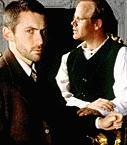SEARCH CurtainUp
REVIEWS
FEATURES
NEWS
Etcetera and
Short Term Listings
LISTINGS
Broadway
Off-Broadway
BOOKS and CDs
OTHER PLACES
Berkshires
London
LA/San Diego
Philadelphia
Elsewhere
QUOTES
On TKTS
LETTERS TO EDITOR
FILM
LINKS
MISCELANEOUS
Free Updates
Masthead
NYC Weather
The Wild Duck
By Les Gutman

K. Steele and R. Wood
(Photo: Tracey Eller)
|
Leaving well enough alone is not something Gregers Werle (Kameron Steele) is very good at. He's the quintessential officious intermeddler in Ibsen's The Wild Duck, and the catalyst for much of what happens. Yet Ibsen's play is so rich in content, few would consider him the play's central focus.
Who it's about is an open question. Is it about Gregers' long-ago friend, Hjalmar Ekdal (Riley Wood), now a putative photographer and vacant dreamer? Or Hjalmar's father (Tom Morrissey), whose faded memories of his days as a soldier and hunter sustain him? Or is it really about Hjalmar's daughter, Hedvig (Lexie Kahanovitz), who wants nothing more than her father's attention and happiness? Or maybe it is the wild duck of the title which, despite being the play's symbolic centerpiece, actually lives in a basket under the eaves of the Ekdal home. We could also ask what The Wild Duck is: a tragedy, a comedy or, as the press release settles it, a tragi-comedy? Will Pomerantz's nicely intimate staging leaves the answer to the first question to the audience, but makes it clear he sees little sustenance in dwelling on the work's comic opportunities.
As was the case in Ghosts (linked below), the previous installment of Century Center's Ibsen Series, this production takes the straightforward road. It's a wise choice; Ibsen never seems to require tinkering to continue to resonate. Indeed, in The Wild Duck we find cognates for countless contemporary dilemmas.
There's nothing in the play, however, that mandates the laggard pace at which Pomerantz has set it. The action unfolds slowly over five acts covering three days. We feel each of them. A little more spring in everyone's step could have been used to good advantage.
The play is chock full of secrets, some better kept than others, not to mention a pack of lies and other assorted manipulations. Gregers, the idealisitic son of a prominent local businessman, has been away and out of touch for years. He returns to find a hornet's nest; his well-intentioned but misguided effort to clear it out unleashes more ill consequences than anyone could have imagined. Actually, there is a fine line here between what's true and what's imagined, underscored by lots of metaphors based on failing eyesight and photography.
This is the first of Ibsen's plays to depend heavily on character development, so the generally strong cast assembled for this production is important, especially in the Ekdal household. Riley Wood is a convincing presence as a man who is diverted by his imagination but spinelessly innocuous, even in his execution of fits of rage. As his supportive if fundamentally dishonest wife, Gina, Patricia A. Chilson is equally persuasive, but the most impressive work here is from Morrissey, whose quiet Old Ekdal Pomerantz has elevated into a moody presence, and young Lexie Kahanovitz, who is as radiant as she is touching.
Mr. Steele, though well grounded, is less compelling as Gregers and, although his character's enigmatic quality comes through, it's really his lack of affect that seems to set the play's subdued tone. Berkowitz is fine if not extraordinary as the elder Werle, as is Karla Nielson as Mrs. Sorby, the housekeeper turned future wife. The Ekdal's two downstairs tenants, Dr. Relling (Duncan Rogers) and Mr. Molvik (Frank Dowd), are not used to especially good effect, Relling's function as Gregers' foil never amounting to much and Molvik's largely comic presence apparently intentionally not being exploited.
The playing area for this production has been set largely between two halves of the audience, and works surprisingly well. Set decoration is evocative and makes for good transitions; traditional costumes are very much in keeping we the production's overall sense..
The Wild Duck is not the most popular of Ibsen's great plays, but it is certainly one of the best. This faithfully rendered production, while not doing much to change our sentiments, is commendable for giving us a good chance to realize what we've been missing.
| THE WILD DUCK
by Henrik Ibsen, translated by Rolf Fjelde Directed by Will Pomerantz Cast: John August Baker, Duncan Rogers, Tom Morrissey, Frank Dowd, Karla Nielson, D. Michael Berkowitz, Kameron Steele, Riley Wood, Martin Balmaceda, Patricia A.Chilsen and Lexie Kahanovitz Scenic Consultant: Ned Fishbein |


